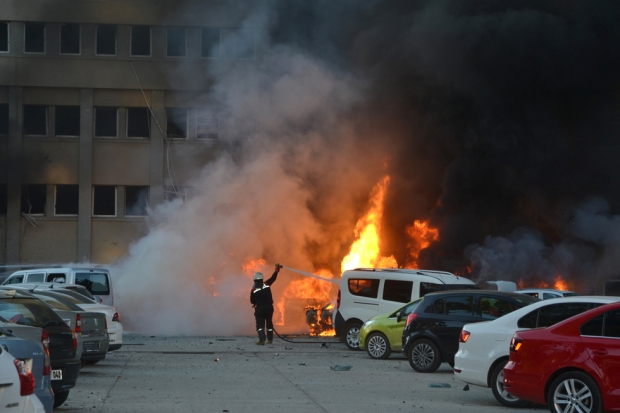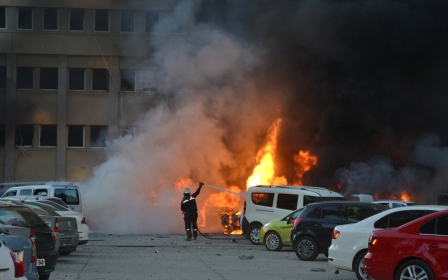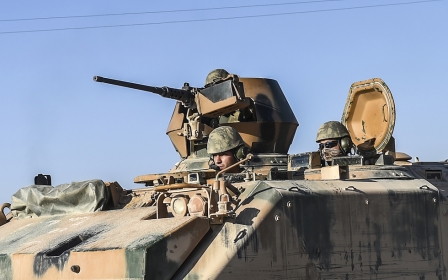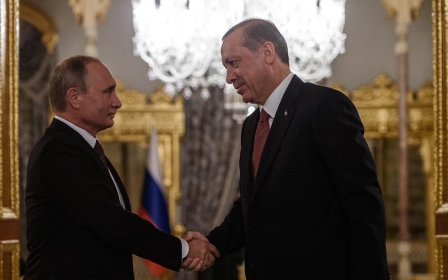Turkey and that EU vote: A painful romance closer to collapse
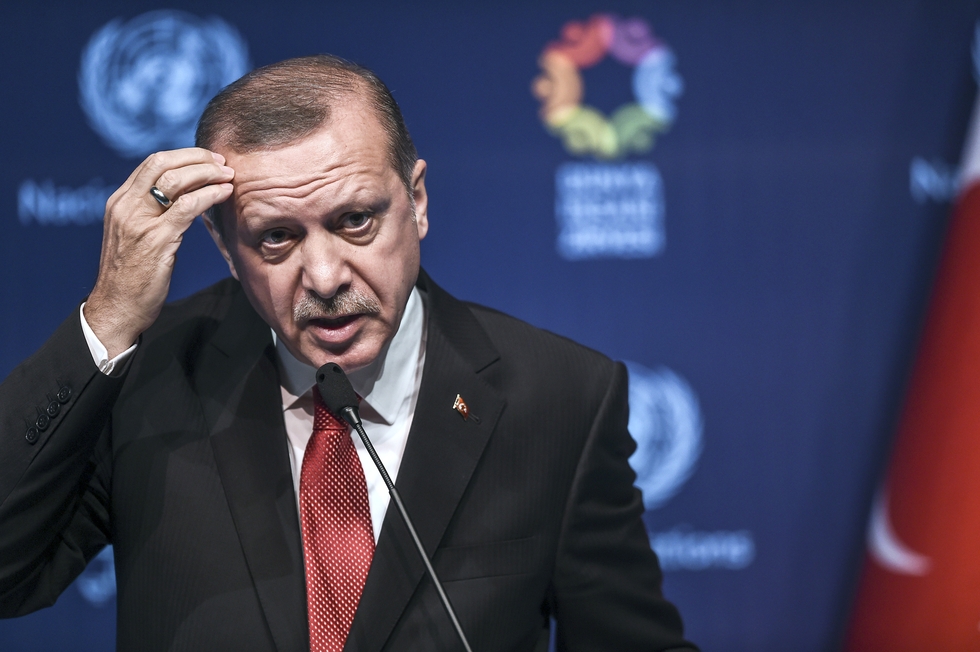
ISTANBUL, Turkey – The European parliament has voted overwhelmingly to temporarily suspend talks with Turkey about its bid to become an EU member.
Despite its symbolic and non-binding nature, the result is likely to deal a serious blow to Turkey’s already-strained relationship with the bloc.
Attention will now turn toward EU member states and how they respond to the vote: of the European Parliament (EP) lawmakers present, 409 voted for suspension, 37 against and 107 abstained.
'Such short-sighted discussions that lack vision are taking place in Europe at a time when solidarity with Turkey should be the issue given the high level of terror Turkey is fighting'
- Omer Celik, Turkish EU affairs minister
Observers believe leaders in western Europe will now find it difficult to ignore the call, despite it presenting no legal obligation to comply.
Turkey downplayed the importance of the vote, with prime minister Binali Yildirim saying: “This decision has no significance as far as we are concerned.”
Earlier this month Turkish President Recep Tayyip Erdogan called for the EU to stop its charade and decide whether it wants Turkey in the club. He said the EU should be brave enough either way to openly declare its decision.
And on Wednesday he said that Ankara could no longer give any credence to the bloc’s actions.
“I am saying this in advance," Erdogan told a conference of Islamic countries in Istanbul. "This vote has no value for us whatever the outcome."
Turkey has been trying to join the Euro club since 1963. Formal accession negotiations to join were launched in 2005.
Ankara had little immediate reaction following the vote, due to a hectic security agenda , including the deaths of three Turkish soldiers in northern Syria, which it blamed on Damascus; and a car bomb near a government office in the southern city of Adana, which killed two civilians.
And CHP deputy chairman Ozturk Yilmaz said: "We think this is a wrong decision. This is not a decision that help's Turkey's struggle for democracy or the climate Turkey currently finds itself in."
Why the EU has a problem with Ankara
EP members who want Turkey suspended speak of a serious degradation in the rule of law, press freedoms and other human rights-related issues since a coup attempt was thwarted on 15 July.
Ankara, on the other hand, accuses EU member states of hypocrisy and a deep-rooted unwillingness to understand the severity of what the coup attempt meant.
'No business as usual with Turkey; we support a freeze of EU accession negotiations' European People’s Party
- Manfred Weber, European People’s Party
Relations have hit such a low that Turkey last week refused to allow an EU delegation to visit if it included the European Parliament’s Turkey rapporteur Kati Piri. Ankara accuses her of being deliberately provocative towards Turkey in her remarks.
The Turkish government has made the utmost use of expanded powers – including the right to rule by decree and bypass parliament - granted to it under a state of emergency. These have been used for a crackdown unprecedented in scope and scale against those whom it says were behind the attempted coup.
The crackdown has resulted in more than 100,000 sackings or suspensions, at least 36,000 arrests, the closure of more than 150 media outlets, the arrest of more than 100 journalists and the closure of hundreds of associations.
READ: How Turkey is strangling the internet - and hurting media freedom
Simultaneously, the government has implemented a series of restrictive measures against the pro-Kurdish Peoples’ Democratic Party (HDP), arresting a dozen of its MPs and its mayors.
The HDP is the third-largest party in the Turkish parliament, but the government claims it is the political arm of the Kurdistan Workers’ Party (PKK) and that it actively assists that organisation, which it considers a terrorist group.
The opposition to admitting Turkey
Various parties within the European Parliament have cited these developments as reasons for concern.
“No business as usual with Turkey; we support a freeze of EU accession negotiations,” said Manfred Weber, head of the center-right European People’s Party, the largest group in parliament, before the vote.
Gianni Pittella, leader of the Socialist Group, the second-biggest in the assembly, said: “Turkey’s EU accession talks must be temporarily frozen. There are not the conditions to proceed now.”
Pittella said it would send a “political message to Erdogan” to stop the “mass detention, accusations against political leaders and MPs, repression of judges and journalists.”
Liberal leader Guy Verhofstadt, the former prime minister of Belgium, said before Thursday's debate that his group too was “asking to suspend the negotiations with Turkey".
“The [parliament’s] move is another sign that Europe sides with terrorists. It is in their capitals that terrorists roam freely. It is them who supply terrorists,” said Erdogan.
'The [parliament’s] move is another sign that Europe sides with terrorists. It is in their capitals that terrorists roam freely. It is them who supply terrorists'
- Turkish President Recep Tayyip Erdogan
Erdogan’s anger is the apparent ease with which groups linked to the PKK, listed as a terrorist outfit by Turkey, the EU and the US, hold events across Europe and even in EU institutions.
Recent statements by German officials that they would offer asylum to anyone from Turkey who they feel is being targeted for political reasons have also displeased Ankara.
Ankara feels like this is a clear signal that Germany will protect Gulen supporters, who Turkey also designates as terrorists.
Turkey-EU relations have never been smooth even at the best of times, but concerns are increasing that growing right-wing tendencies in EU states and a shift toward populism-based politics in Turkey could result in irreparable damage to relations.
If Turkey rejects EU, where would it turn?
Turkey began its accession process in 2005, but it has only managed to successfully negotiate one chapter out of 35 that are required, and this was when Ankara was engaged in a whole-hearted reform process to meet EU standards. This is mostly put down to blockages created by various EU states.
Turkey, in recent years, and in recent months even more so, has increasingly talked of turning towards Russia and even the Eurasian military and economic grouping called the Shanghai Cooperation Organisation.
Mensur Akgun, a professor and chair of the international relations department at Istanbul’s Kultur University, told Middle East Eye that in spite of being an optimist he fears the current Turkey-EU spat might spell the end of the relationship in its current form.
READ: Turkey’s Erdogan says Europe are ‘real Nazis’ amid EU row
He stressed that the European side bears a lot of responsibility for the state of affairs.
“There have been problems in the Turkey-EU relationship before, but this time around the problem is so much deeper. The arguments being put forward by the Europeans regarding freedom of expression and human rights might be valid but they are no longer a credible counterpart in this discussion and have no more sway over Ankara,” Akgun said.
He said for Turkey-EU ties to be put back on the rails it would require EU states to stop equating the European ideal with Christianity and instead go back to really equating it with human rights and the rule of law.
“The European deputies have no idea what they are talking about. The accession process was already practically suspended in 2006. Eight chapters were blocked by the European Council, five by France and five by Cyprus,” he said. “The EU has no leverage left over Turkish public opinion and the Turkish government. The threat of punishment sounds very hollow.”
Migrant deal at serious risk
At immediate risk of collapse is the migrant deal reached between Turkey and the EU in March.
The essence of the deal was that Turkey would prevent the nearly 3 million Syrian refugees it hosts from undertaking perilous journeys towards Europe and in return get two batches of 3bn euros in financial support and an expediting of its EU accession process, including a deal on visa-free travel to the Schengen zone for Turkish citizens.
The deal was already in danger of collapsing after the EU failed to keep its side of the bargain, according to Turkish officials. Erdogan has repeatedly accused the EU of reneging on making the payment it promised.
Turkey’s foreign minister, Mevlut Cavusoglu, and European Union affairs minister, Omer Celik, have also slammed the EU for constantly pushing back the date for granting Turks visa-free travel.
In some quarters it is believed that the risk to the migrant deal could be behind some European leaders, including the German chancellor and the EU’s foreign policy chief, warning the EP of the dangers of suspending Turkey’s accession.
EU foreign policy chief, Federica Mogherini, warned that halting Turkey’s accession process would be a “lose-lose” move.
'The EU has no leverage left over Turkish public opinion and the Turkish government. The threat of punishment sounds very hollow'
- Mensur Akgun, academic
German Chancellor Angela Merkel on Wednesday was reported as calling for the need to continue a dialogue with Turkey while criticising Ankara for restricting media freedoms and for recent arrests.
Turkey’s EU Affairs Ministry in a statement on Wednesday stressed that the EP vote is non-binding, whatever the result. It also said the decision to accept a state’s membership bid and to start negotiations rested with the European Council, not the EP.
In recent weeks, Erdogan has called on the EU to make a final decision on whether it wants Turkey in the club and to be brave enough to openly announce the decision.
The vote in the European Parliament on Thursday might be symbolic - but could be the final message Turkish officials are waiting for.
Middle East Eye propose une couverture et une analyse indépendantes et incomparables du Moyen-Orient, de l’Afrique du Nord et d’autres régions du monde. Pour en savoir plus sur la reprise de ce contenu et les frais qui s’appliquent, veuillez remplir ce formulaire [en anglais]. Pour en savoir plus sur MEE, cliquez ici [en anglais].


